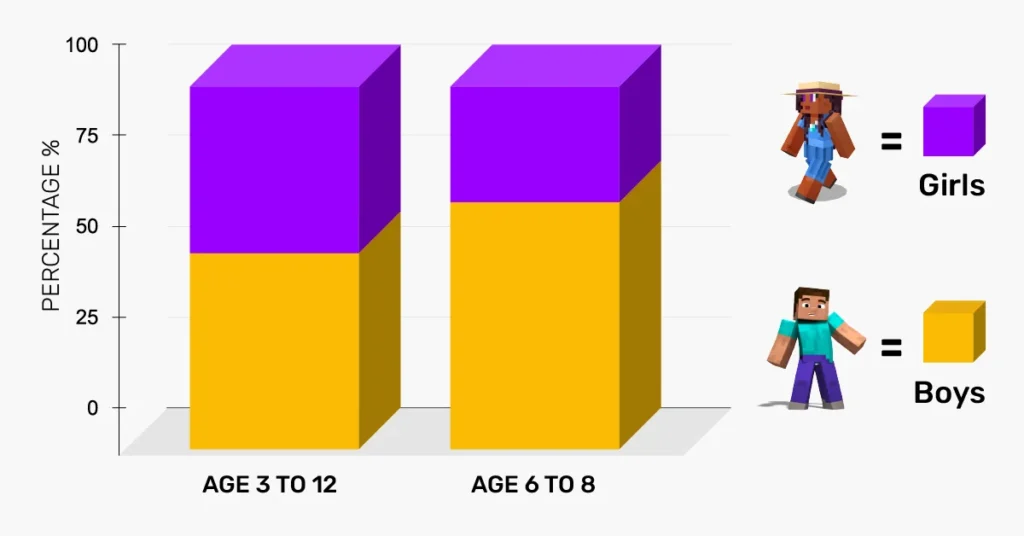Minecraft is a popular sandbox video game that allows players to explore, build, and create in a virtual world. Several kids enjoy playing Minecraft as it is a great method for them to learn about problem-solving, design, and creativity.
However, as with any game, it is important for parents to monitor their children’s gameplay and ensure that they are using it in a healthy and balanced way. It is also worth considering the age rating of the game, as it is rated for children aged 7 and above.
In this blog, we will try decoding whether or not Minecraft is good for your kids.
What is Minecraft?
Minecraft is a video game that allows players to build and explore virtual worlds made up of blocks. In the game, players can gather resources, craft items, and interact with the environment and other players. Designed and launched by Markus ‘Notch’ Persson in the year 2009, the game has been praised for its ability to foster creativity and teamwork, and has become immensely popular with players of all ages.
How does one play Minecraft?
To play Minecraft, you will need to purchase a copy of the game and install it on your device. Minecraft is available on a variety of platforms, including PC, Mac, Linux, PlayStation, Xbox, and Nintendo Switch.
Once you have installed the game, you can start playing by creating a new world or selecting a pre-made world. In Minecraft, you can explore a vast, procedurally generated world made up of blocks. You can gather resources, craft items, and build structures to survive and thrive in this world. You can also encounter and defeat enemies, complete quests, and play with friends in multiplayer mode.
What are Minecraft’s different modes?
There are many different gameplay modes to choose from in Minecraft, including survival mode, creative mode, adventure mode, and spectator mode. Each mode offers a different gameplay experience and challenges, let’s understand them better –
- Survival mode: In survival mode, you must gather resources, craft items, and build structures to survive in a randomly generated world. You will need to gather food and resources to stay healthy, and you will also need to defend yourself against mobs (hostile creatures) and other dangers.
- Creative mode: In creative mode, you have unlimited resources and the ability to fly, allowing you to build and create to your heart’s content. You are not restricted by hunger or the need to gather resources, and you are not attacked by mobs.
- Adventure mode: In adventure mode, you can play custom maps created by other players and experience gameplay challenges created by the map maker. You are not able to break blocks or place blocks in adventure mode, and you must follow the rules set by the map maker.
- Spectator mode: In spectator mode, you can fly through the world and observe gameplay, but you cannot interact with the world or players in any way.
Is Minecraft kid appropriate?
Now answering the question of whether playing this game is fruitful for your kid, Minecraft has generally been considered appropriate for children of all ages. The game has been rated “E for Everyone” by the Entertainment Software Rating Board (ESRB), which means that it is suitable for players of all ages and contains content that is generally suitable for everyone.
However, the game allows players to interact with each other online, and there is no way to filter or monitor the conversations that take place. This can potentially expose children to inappropriate language or subject matter and thus it is important for parents to monitor their children’s online activities and set appropriate boundaries to ensure they have a safe and enjoyable gaming experience.

Up to 54% of boys aged 3 to 12 play Minecraft. This is compared to only 46% of girls in the same age group.
68% of boys aged 6 to 8 play Minecraft. Only 32% of girls in the same age group play Minecraft.
Playing Minecraft – The Path To STEM Learning?
Minecraft can be a great way for children to develop an interest in science, technology, engineering, and math (STEM). The game can also help them develop important problem-solving and critical-thinking skills.
Minecraft is a very popular video game that has been used in classrooms around the world to help students learn and practice skills in science, technology, engineering, and math (STEM). Here are some ways that Minecraft can help with STEM education:
- Problem-solving: Minecraft provides a virtual sandbox where students can explore, build, and create, encouraging them to think critically and solve problems.
- Collaboration: Minecraft allows students to work together and communicate effectively to achieve a common goal.
- Creativity: The game allows students to let their imaginations run wild and be creative in their building and design.
- Math skills: Students can use math skills to measure, calculate, and build in Minecraft.
- Science: Students can learn about physics, biology, and other scientific concepts through exploration in Minecraft.
- Technology: Minecraft can be used to teach students about computer programming, computer science, and other technology-related topics.
- Engineering: Students can design and build structures and machines in Minecraft, practicing engineering principles.
That being said, Minecraft has certainly made a significant impact on children and adults with a large and dedicated, and diverse player base. However, it is important for parents to ensure that their kids learn to balance their time spent playing Minecraft with other activities, such as exercise, schoolwork, and spending time with friends and family. This in the long run would eventually help them in reaping the benefits of playing this game.


Leave a Reply